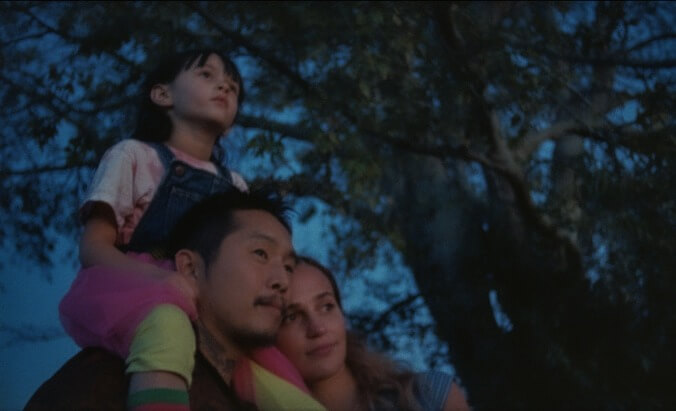Blue Bayou buries a real-life nightmare under a lot of maudlin Hollywood phoniness
Justin Chon uses every contrivance and cliché in the book (and invents a few more) to sap his deportation melodrama of any life

In the overheated melodrama Blue Bayou, writer-director Justin Chon casts himself as Antonio, a Korean American man living in New Orleans who suddenly finds himself facing deportation, even though his American parents adopted him back in the 1980s, when he was a young child. (The danger of being expelled from the country stems from a simple failure on their part to update his immigration status.) Sadly, this is a real, all-too common nightmare. Though Congress granted blanket citizenship to any foreign-born adoptee who was brought to America after the year 2000, the ruling doesn’t retroactively apply to anyone who came before. Recently, ICE has been targeting more and more vulnerable people in Antonio’s situation: those who have grown up in America, and have always considered themselves Americans, suddenly treated like strangers in their own country.
This is certainly a shameful, abhorrent practice that spotlights the abject cruelty and xenophobia of America. Yet Blue Bayou sets out to illustrate this obvious point by dramatizing Antonio’s life in the most sensational, manufactured way possible. It’s not just that Chon, an actor-turned-director who previously made the indie dramas Gook and Ms. Purple, inevitably preaches to the choir with his messaging. It’s that he does so through laughable contrivances and an endless parade of maudlin scenes, like he was uncertain that a sympathetic audience would grasp his lesson if the drama wasn’t cranked up to 11. “If you want to send a message, use Western Union” is an old adage that can feel a bit short-sighted in these perma-urgent times. But just as you’re ready to dismiss the expression as stale claptrap, along comes a movie like Blue Bayou to remind you that it sometimes rings true.
Even before Blue Bayou’s plot really kicks in, Chon immerses his audience in a saccharine vision of familial intimacy. The film opens with Antonio being denied a job because of his past criminal record in front of his stepdaughter, Jesse (Sydney Kowalske). Immediately afterwards, they rush to the hospital to see his pregnant wife, Kathy (Alicia Vikander), and an ultrasound of their future daughter, a miracle that looming financial pressure can’t diminish. More mawkish displays of affection follow, like when Antonio lets Jesse—who fears that he’ll love his biological daughter more than her—skip school and hang out with him instead. Things eventually sour when a loud argument in a grocery store catches the attention of Kathy’s ex, Ace (Mark O’Brien), a policeman who demands to see Jesse, his daughter, more often. Unfortunately, Ace’s partner (Emory Cohen) escalates the argument out of transparent prejudice, which sends Antonio to jail and into the hands of ICE.
Chon loads his premise with eye-rolling dramatic coincidences and cheap moral contrasts. It’s one thing that Jesse’s father is a cop who happens to be on duty and in the grocery store at the exact time Antonio is there. It’s another that Chon juxtaposes him with a “bad cop,” a bigoted, donut-eating caricature, to ensure the audience knows who to distrust more. This ethical disparity will eventually weigh heavily on a finale that only further clarifies the lines between “good” and “bad” as if they were unclear. Chon doesn’t stop there, though. He keeps bringing in stale archetypes and “provocative” characters: Antonio’s disapproving, slightly racist mother-in-law; a “funny,” diverse gang of local motorcycle thieves; a friendly ICE agent (Toby Vitrano), supposedly Antonio’s best friend even though we never see much evidence of it; and a borderline-magical Vietnamese woman (Linh Dan Pham) who takes time away from dying of cancer to help Antonio forgive his biological mother. No amount of good acting could salvage this ensemble of offensive clichés.
Complementing Blue Bayou’s ridiculous characters are its exaggerated plot incidents, which include a heist, a suicide attempt, and flashbacks to child abuse. Chon moves between two tonal modes: sappy, which he saves for the ostensibly grounded scenes between Antonio and his family, and histrionic, which covers basically everything else. He also incorporates questions of disjointed identity into the mix. Antonio may sound American, speaking in Chon’s creaky Louisiana accent, but he’s always felt lost in his country thanks to a series of bad hands he’s been dealt since childhood. Blue Bayou becomes a drama about someone on the verge of possible deportation confronting the ghosts of his past in order to embrace the angels of his present. That’s not an unworkable concept, but Chon executes it in the most heavy-handed ways imaginable, bluntly recycling key dialogue and employing way too many close-ups to emphasize emotion. Even the film’s 16mm photography feels like an affectation—a cheap stab at realism that the film can never achieve.
All of these bad choices culminate in an ending so grotesquely manipulative that it’s actually a relief when Blue Bayou cuts to the obligatory title cards detailing the real-life inspirations, if only just because they signal that this egregiously overwrought movie is coming to a close. An emotional crescendo only works if the audience is invested in the drama of the characters, which Chon tries to force by heightening everything. Blue Bayou is designed to jerk tears out of a plainly tragic scenario, but all it does is expose the strings behind the puppets and the set. In the film’s failures, we can see the limits of good intentions: It doesn’t matter if a heart is in the right place if the mind isn’t too.